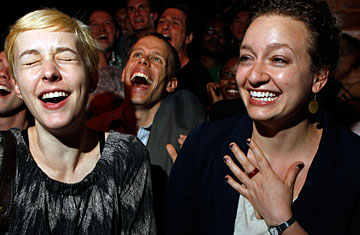
People celebrate inside of Stonewall Inn after the New York Senate passed a bill legalizing gay marriage in New York June 24, 2011.
(2 of 2)
Opponents needed a new tact since the New Yorkers who will now be able to rush out to get married aren't the beneficiaries of an out-of-control judiciary, the usual object of conservative blame. Instead, wedding thank-yous will be owed to elected officials — including the late-breaking Republican senators who made the win possible and the face-to-face lobbying by New York Mayor Michael Bloomberg, an independent. It was those folks who simply decided that momentum in favor of gay marriage was too strong to resist any longer. "This is driven by compassion. I'm tired of Republican, Democrat politics; I'm tired of blowhard radio people, blowhard television people, blowhard newspapers," said New York State Senator Roy McDonald, a Saratoga banker, a Republican and a Vietnam War combat veteran, as he announced he'd switch his vote despite heavy pressure from party bosses and conservative activists to not do so. "They can take the job and shove it. I come from a blue-collar background, I'm trying to do the right thing, and that's where I'm going with this."
The political climate is such that Republicans have been angling to avoid making 2012 a repeat of 2004, when a nationwide debate over social issues was a major undercurrent in the successful re-election of George W. Bush. That year, GOP strategists helped boost turnout by coordinating winning efforts in 11 states to amend state constitutions to ban gay marriage. Instead, as political scientist Larry Sabato told TIME this week, most of the major GOP contenders for the presidency in 2012 would rather be known for where they stand on the economy than for making gay marriage a do-or-die issue. "Gay rights has become a flash point on the Republican side," he said. "As you saw in [the June 13 CNN] debate, most candidates repeat the social conservative mantra, 'Marriage should be between one man and one woman.' But the mainstream big players like Romney are hesitant to go further. There is an increasingly assertive libertarian wing of the GOP that says, 'Keep government out of the bedroom.'"
With the changing tenor of the political debate, marriage equality has made gains, says Michael Klarman, a Harvard professor who has long studied the way courts help usher in powerful social change — usually ahead of public opinion. He said the courts helped set the table for changes like the gay rights developments in recent years, but it's no surprise that as public opinion changes, votes like the new New York legislation and — eventually — up-or down popular votes will follow in order to expand on those gains. "It's really been amazing to see how fast this transformation has taken place, especially this year," Klarman told TIME. "You've seen the wealthy Wall Street conservatives — perhaps at the behest of Bloomberg, begin weighing in in favor of gay marriage. You've seen the public awareness campaigns by professional athletes and the president of the Phoenix Suns come out. Watching this, it has made me think what it must have been like in the 1960s as all the Civil Rights changes began to take place."
He said a vote like the one in New York lawmakers was inevitable, and that it will quickly join the swell in favor of gay marriage already rising in other areas of the country. Those changes were on full view in California last week, as first a federal judge rejected efforts to vacate last year's landmark ruling in favor of gay marriage by Chief District Judge Vaughn Walker, and then when a panel of federal bankruptcy judges unanimously agreed that federal laws that insist upon treating married gay couples differently than straight couples are unconstitutional. "I have a feeling that these people manning the walls against gay marriage are going to wake up in 50 years and realize they were in the same position that southern whites were in when they rallied in the 1950s to defend white supremacy," Klarman told TIME.
Meanwhile, Klarman said both sides in the marriage debate err when they cast their issue in libertarian terms, as Dolan did this week. Saying the government has no role in marriage is foolish, he said, whether you're trying to argue for or against gay marriage. "Of course we want the government to set the rules for marriage," Klarman told TIME. "We have always depended on the government to do just that, and nobody would argue we don't want the government setting the rules that say 12 year olds can't marry or that brothers and sisters can't marry. Gay marriage is simply not a libertarian issue."
